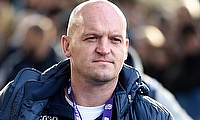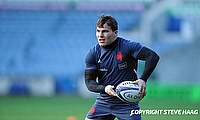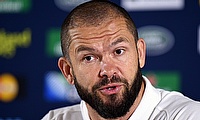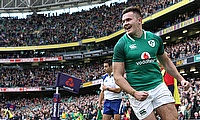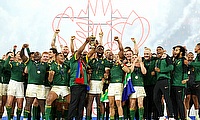Warren Gatland and Wales - a tale of two halves
March 2008 Warren Gatland steers Wales to a six nations grand slam just months after taking charge of the national side. Just over three years on, Gatland is to lead his side into the World Cup on the back of a poor run of form and with the majority of Welsh fans questioning his ability to coach the side. His time in charge of Wales really is a story of two halves.
Hours after their disastrous exit from the 2007 World Cup, the Welsh Rugby Union sacked national coach Gareth Jenkins and began a worldwide search for his successor. On November 9th 2007, Warren Gatland was unveiled as the next coach for the national side, taking up his position from December of that year. He entered the job with a reputation for getting results when they mattered. As coach of Ireland he had faced a difficult task but laid the foundations of a successful side for years to come. With Wasps he turned the club from relegation battlers to triple Premiership champions and lifted the Heineken Cup. Back in New Zealand he won the Air New Zealand Cup with Waikato, before becoming a technical advisor with the Chiefs.
He gained instant approval from Welsh fans who had high hopes for the nation's third New Zealand born coach. Within months he had written himself into Welsh rugby folklore by leading the national side to a six nations grand slam. In a matter of months he had taken a deflated team and turned them around. There was a strong ethos within the squad and players were made to work for their place in the side. Take the number 10 shirt for example, during the six nations both James Hook and Stephen Jones played at fly half, both having to raise their games to secure a starting berth in the next game. This was echoed across the fields, the competition to impress the new boss was raising the standard of the team. There was a new optimism amongst the Welsh public.
Despite a disappointing summer tour to South Africa, the mood in the camp was not dampened. In the autumn internationals Wales put on good showings against the Springboks and the All Blacks and a victory against Samoa. The final result of the autumn was a well deserved win against Australia, a rare victory against Southern Hemisphere opposition.
The mood amongst team and the public was set to defend the six nations championship. Wales started the championship well with victories over Scotland and the old enemy England, before a narrow 5 point loss in Paris. The subsequent victory in Rome left the side with a chance of defending their championship against Grand Slam chasing Ireland. Ireland narrowly won the game 17-15, thanks to a late drop goal from Ronan O Gara and an agonizing long range penalty miss from Stephen Jones in injury time, to leave Wales in 4th place.
Going into the 2009 Lions tour, during which he acted as forwards coach, Gatland record with Wales 10 victories from 16 tests, a respectable 62% win rate. The reputation of Gatland and his players were enhanced during the tour with players like Jamie Roberts announcing themselves as World Class players. The future of Welsh rugby seemed in good shape and Gatland was held in high esteem by the Welsh public.
Since the Lions tour things have taken a turn for the worse. Since the tour Wales have only won 7 of 22 internationals, a win rate of a mere 31%. In this time they have beaten both Scotland and Italy twice, whilst also recording autumn international wins against Argentina and Samoa in November 2009. Their only victory over a side ranked above them in the IRB rankings came earlier this year against an out of sorts Ireland side. Other results have seen 2 defeats to France, England, Australia and South Africa, 4 against the All Blacks and disappointing results against Fiji (drawn) and the Barbarians (last minute loss). Despite this the Welsh Rugby Union have extended his contract for a further 4 years, much to the surprise of the Welsh public many of whom have been calling for Gatland's head.
During the past two years Gatland has faced many problems as Welsh coach. A host of injuries have lead to him calling inexperienced players into the squad. Most notably Tom Prydie who, at the age of 18 year and 25 days, became the youngest ever Welsh international despite only having played in a handful of regional games. This came at the expense of players who were performing consistently week in, week out for their clubs. Some of Wales' most notable players have suffered dramatic losses of form since the Lions tour, Jamie Roberts and Mike Phillips being the most notable. Yet Gatland has stuck by his players through this often at the detriment to the side as a whole. Both scenarios, along with the inclusion of an untested Gavin Henson, seem to indicate the Gatland has his favourites and will play them no matter what.
What is most worrying to the Welsh public is that Wales' game plan seems not to have changed or evolved during Gatland's time in charge. There is a heavy emphasis on a kicking game and with ball in hand most sides have cottoned onto Gatlnad's one dimensional tactics. Wales will keep working the ball towards the one touchline, taking defenders with them through the phases, until they suddenly switch direction and spread the ball to the other wing. There seems to be no plan B and few players seem keen to stray from the game plan and play what is in front of them. More worrying is that basic skills seem to be slipping.
Another feature of Gatland's reign is on fitness. Players face a grueling fitness regime in the lead up to tournaments to ensure that they are amongst the fittest players on the planet. It is true that the Welsh players have shown they have incredible levels of fitness but there is a downside to this regime. In some games Wales have looked lethargic, as if they have worked too hard in the lead up to matches. Also, the training regime is so tough that a disproportionate number of players are becoming injured during these sessions compared to other nations.
Wales will go into the World Cup believing that they can challenge the best sides in the World. They start against reigning champions South Africa and will be aiming to beat the Springboks but there is a more worrying threat the lies in wait. In Wales' group are Samoa and Fiji, both of which have knocked Wales out of past World Cups. Both sides will play a simple game plan targeting Wales' backs aiming to cause disruption and take advantage of this. If Wales alter their game plan and are able to play a more forward orientated game without any high risk offloads, they have enough to beat the South Sea islanders and progress to the quarter finals. If they don't progress, it will be time to Gatland to fall on his sword.



